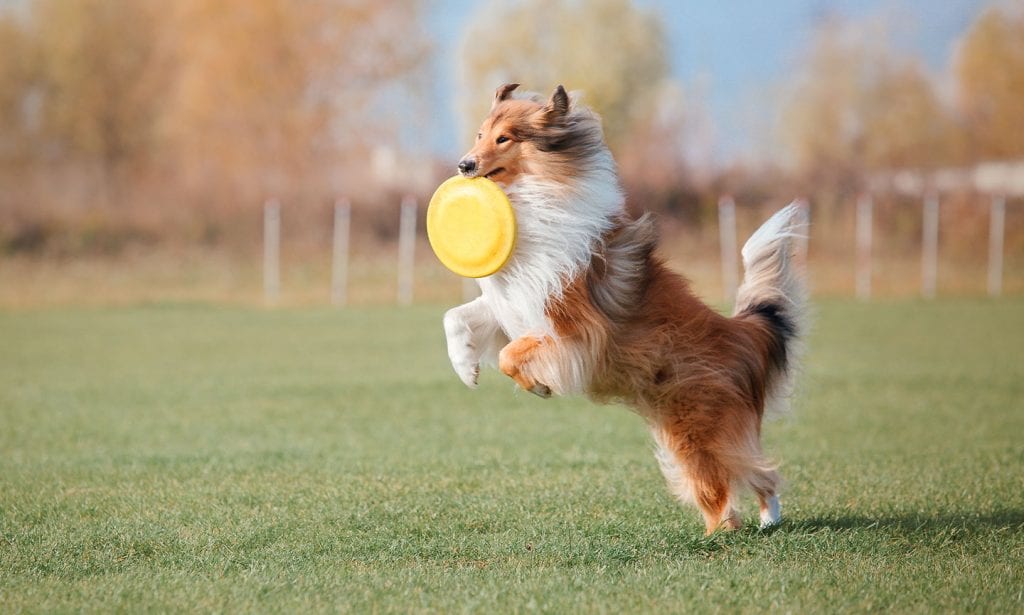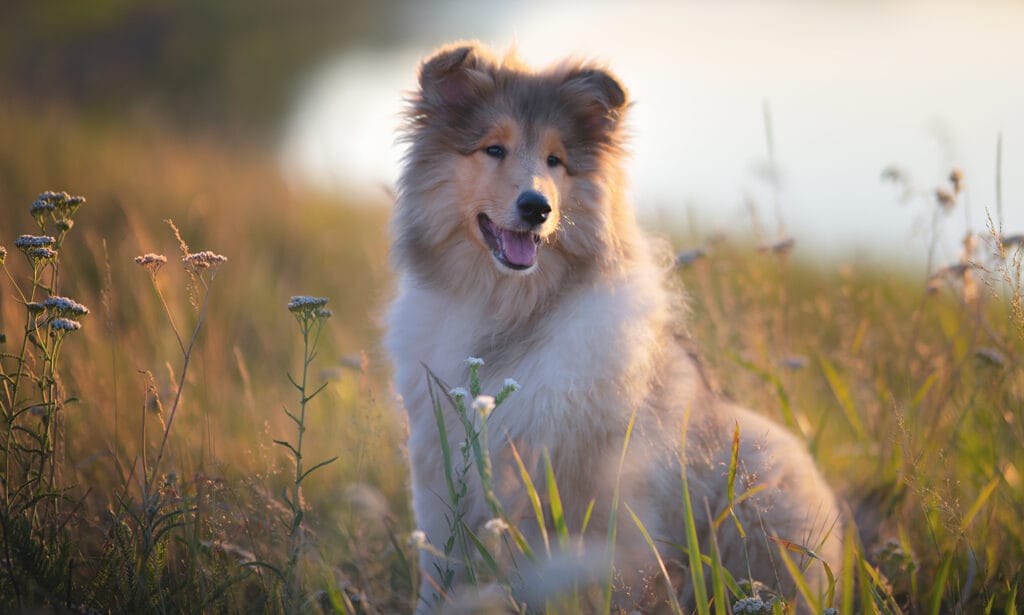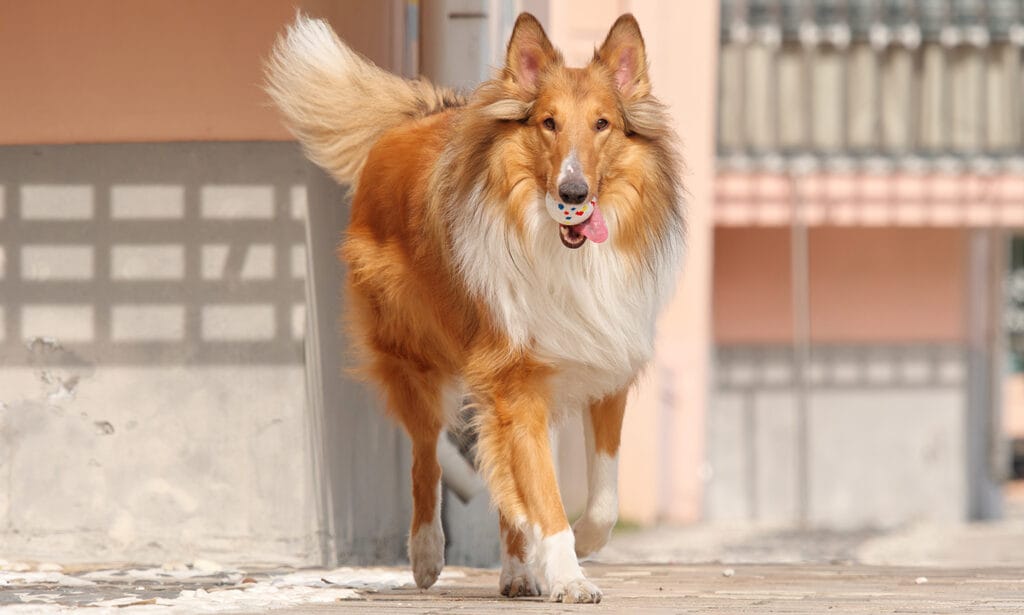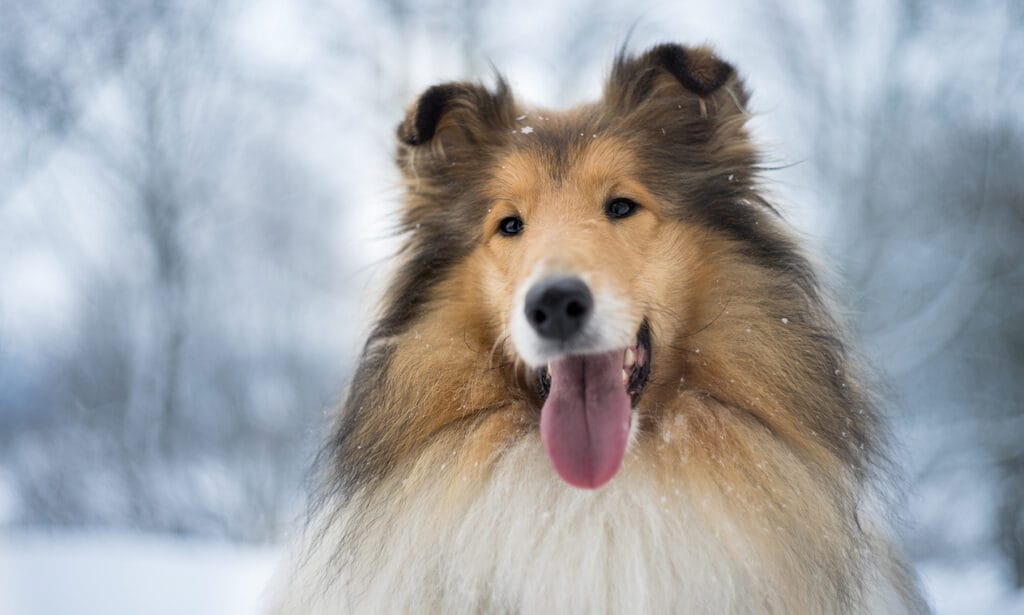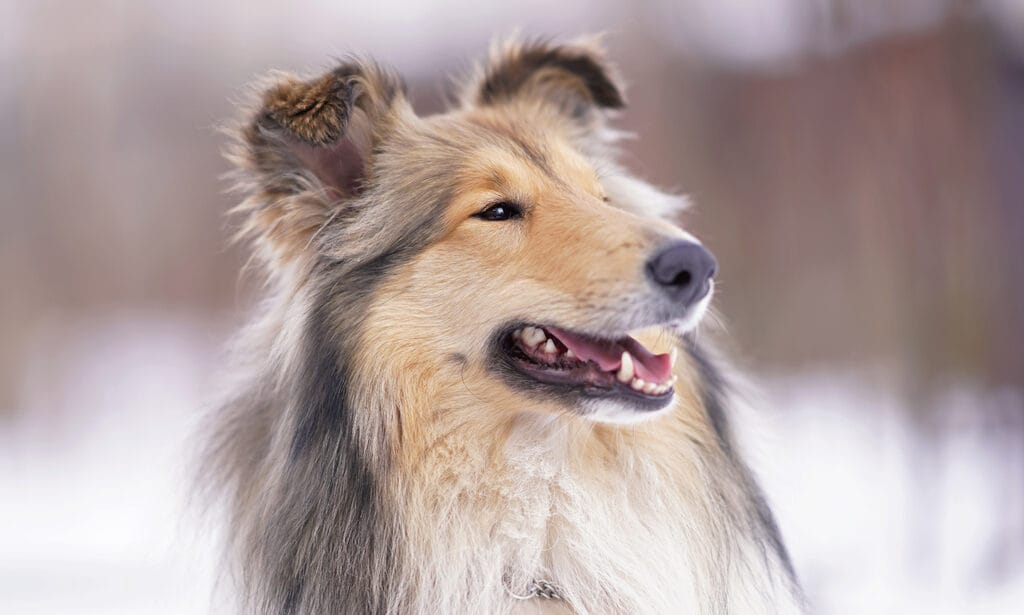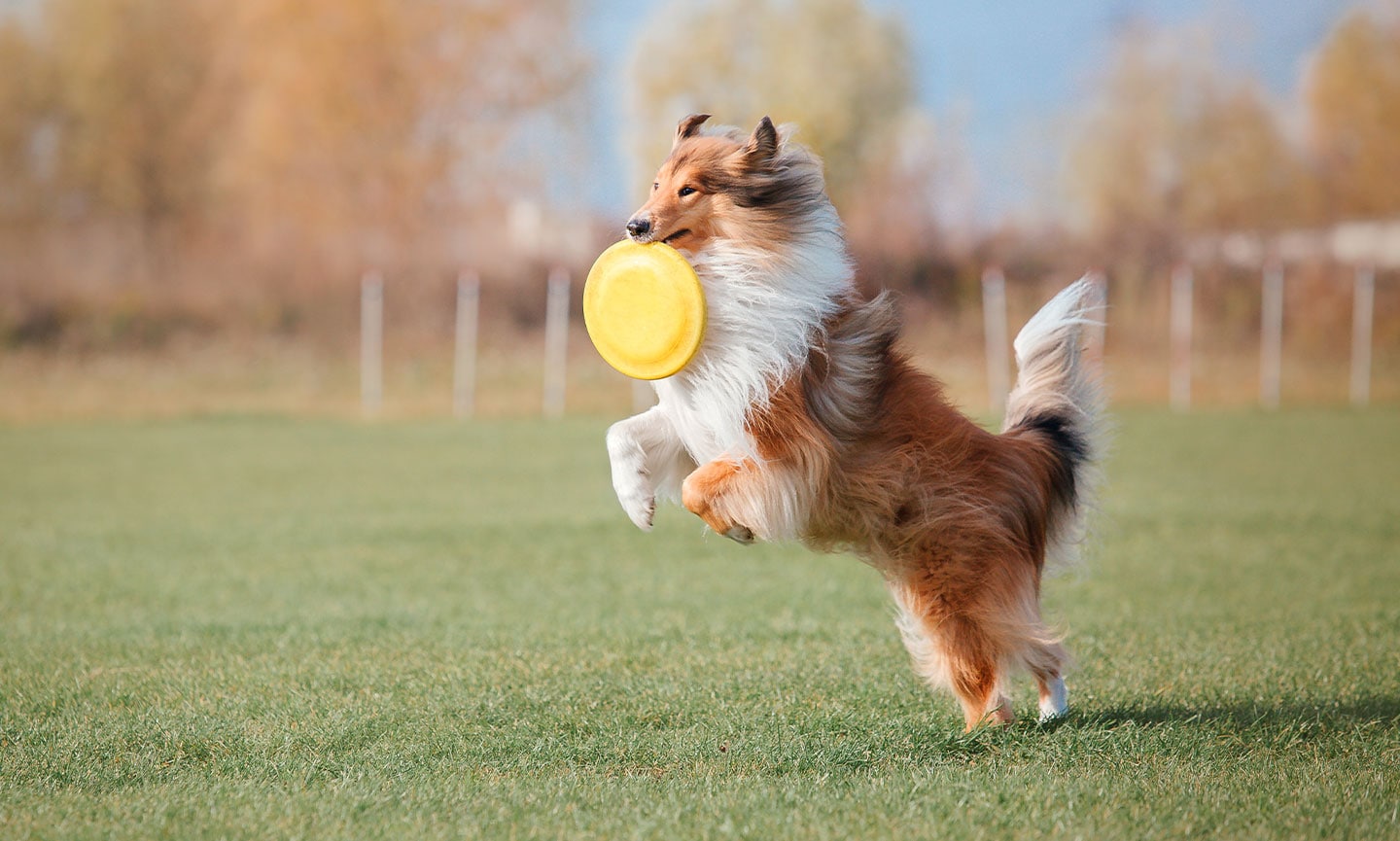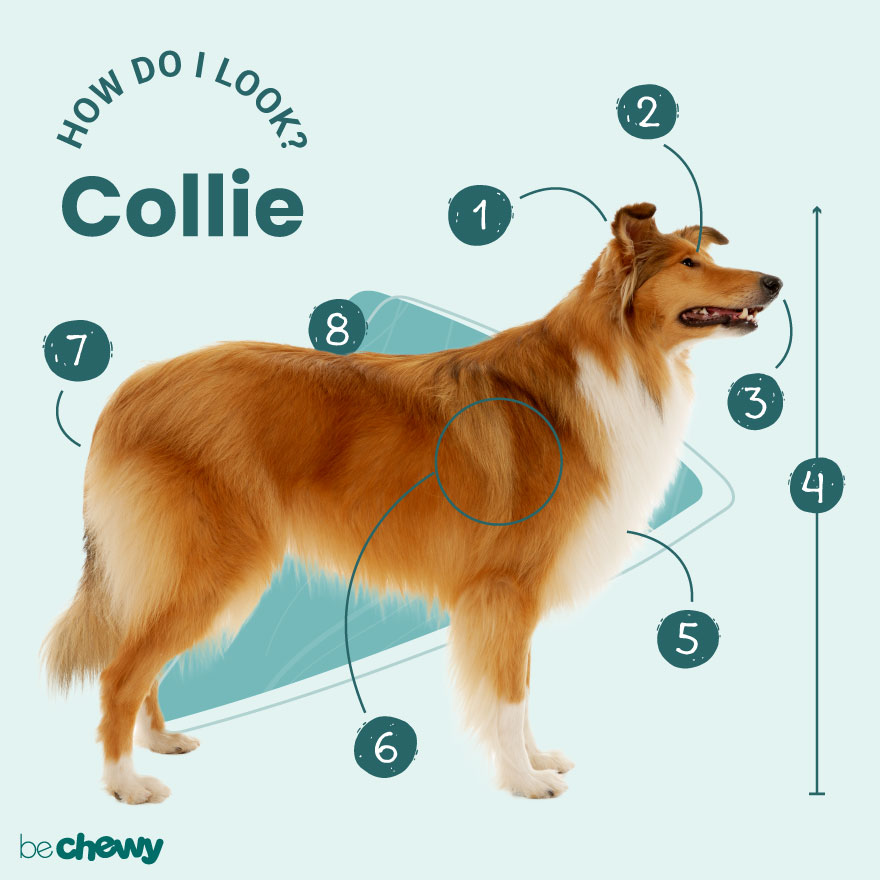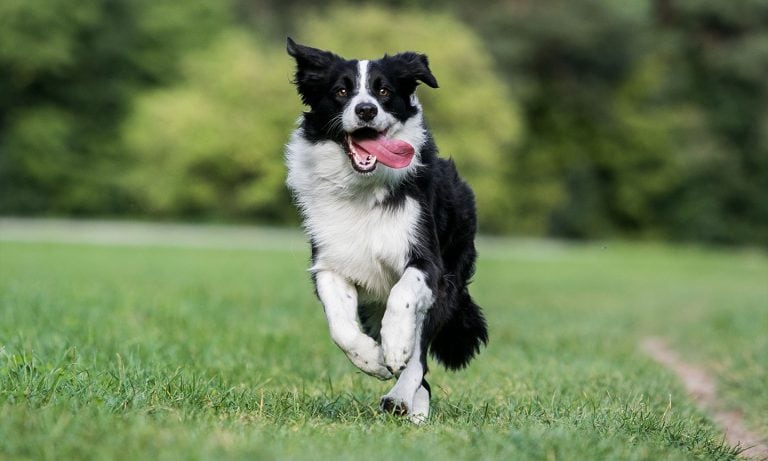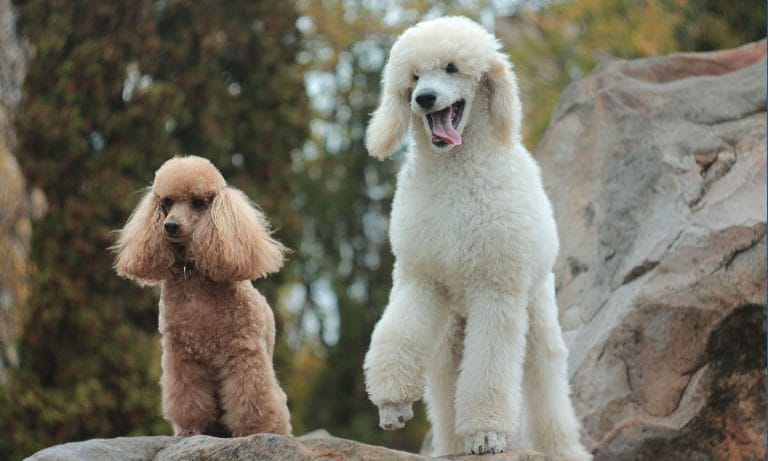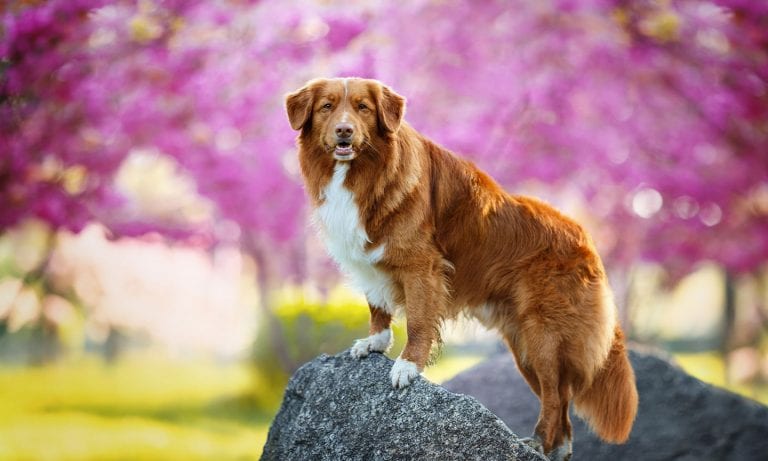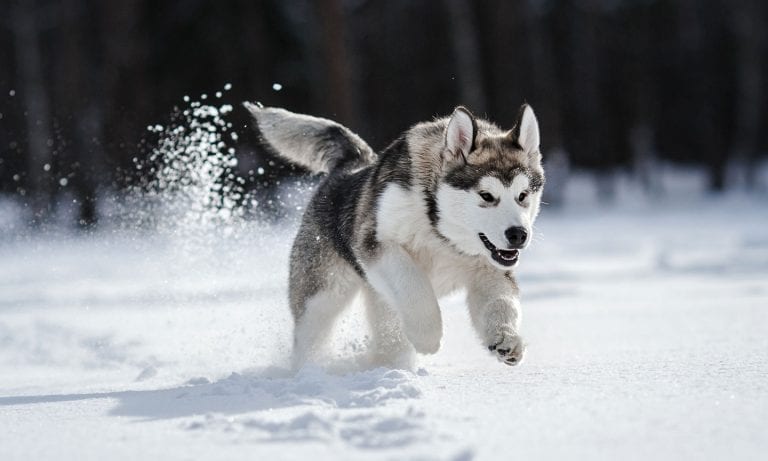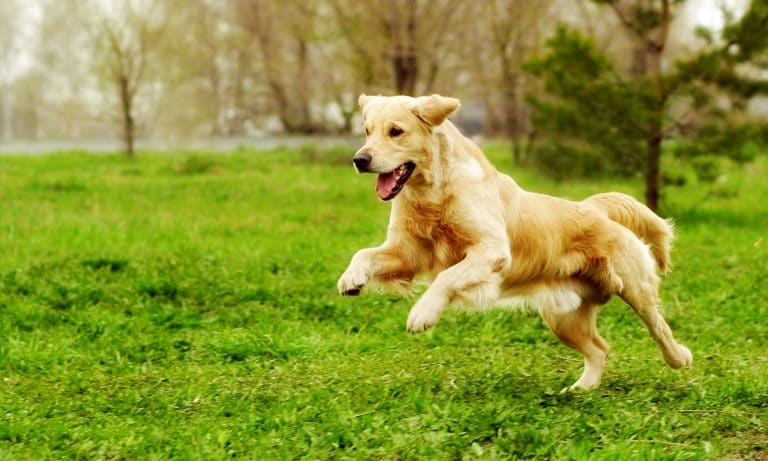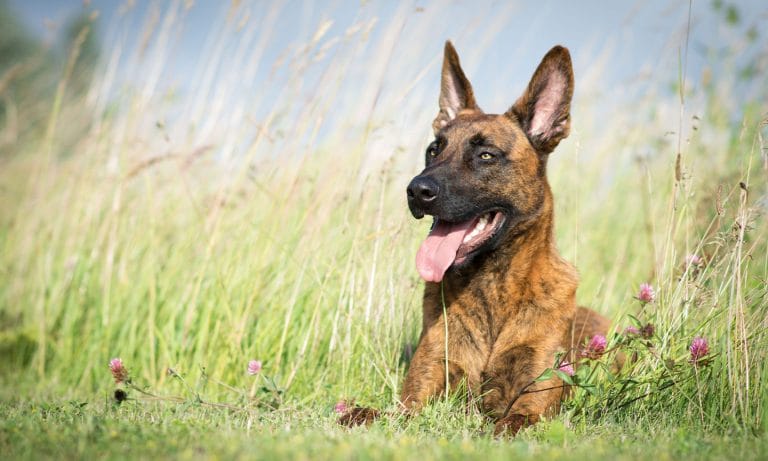If Collie dogs were Hollywood stars, they’d be… wait, they are movie stars! Remember Lassie, Timmy’s beloved protector and companion in the classic films and TV series? Well, she was a Collie. And when you get to know this breed, you’ll quickly understand why. Few dogs better embody the notions of loyalty and friendship. Smart, easy-to-train and affectionate, Collies are among the most popular family dogs, keeping children entertained and busy with their endlessly energetic, live-in play date. Just like children, your Collie will quickly let you know when they’re bored. They’ll talk, and you’ll listen because their bark is no joke. But you’ll quickly forgive the chatter once you’re out for your long daily walks—these pups do need a lot of exercise—and your celebrity status around the neighborhood starts to rise alongside your elegantly furry friend. Did you know the Collie is one of only four dogs to have a star on the Hollywood Walk of Fame? It’s the company you keep, after all.
Breed Snapshot
Temperament:
Family FirstSuper-trainableFriend To AllCoat Color:
Black White And TanBlue MerleBlue Merle And WhiteBlue Merle And White And TanSableSable And WhiteSable MerleSable Merle And WhiteWhiteWhite Merle
Best For
Highly trainable, extroverted and family friendly, Collies are best for active singles or families with children and homes where they'll have a fenced-in yard to roam. Pet parents searching for an intelligent and sensitive dog will love bringing a Collie into their lives.
Collie Temperament
Collies are the quintessential extroverts. They are gregarious animals who seek companionship, love their families and are great with kids and babies. But jealous types, beware. While their love for you will be unwavering, they’ll happily spread that love to just about anyone they meet, be that strangers or other pets. Naturally, they don’t have high biting tendencies and aren’t known to be a particularly aggressive breed. Collies are also big fans of play, and many love nothing better than to speed around the yard chasing a ball or Frisbee. Yes, they are the ultimate teammate you’ve always dreamed about.
Fans of fun though they may be, Collies are not classified in the American Kennel Club’s Sporting Group but are instead members of the Herding Group (they were used for centuries to herd sheep on working farms). So, if you own livestock, or simply want to channel your inner sheep farmer, then a Collie might be just the dog breed for you. You might even find yourself competing in a herding event or two.
Because these dogs were born to have a job to do, they’ll get noisy when they’re lonely or bored. A tired Collie is a quiet Collie. If your pup is barking a lot (and there are no strangers lurking), it’s a sign your Collie may need more exercise and time with you. Take them on extra walks and play games with them to help release that extra energy.
Herding behaviors like heel nipping or bossiness can also be intimidating to children. Of course, every dog is an individual and not all Collies display these traits. But for many parents, these concerns are outweighed by the breed’s other kid-friendly traits. After all, Collies are great family dogs. It’s literally how they became so famous. Of course, it’s not only important to socialize and train all dogs, but pet parents should also teach children how to properly interact with dogs.
Collies have a low prey drive and are not typically used as hunting dogs, but they do perform a variety of other jobs. They’re popular as service dogs, partly because of their versatility, partly because they retain training so well and also because of their ability to adapt to a variety of living situations and the energy levels of their families. Collies are also used as therapy dogs. They really are a well-rounded dog.
How to Care for a Collie
While it’s true that Collies are high-energy dogs who shed a lot and like (read: love) to bark, they can be a surprisingly good choice for first-time pet parents. Collies usually get along well with other pets and children, are easy to train and are adaptable to many different lifestyles. Plus, they want to take care of you as much as you care for them.
Collie Health
Collies have a life expectancy of 12-14 years, which is a fairly typical lifespan of medium-sized dogs, but Collies do have a few health problems to look out for. Be sure to purchase your puppy from a reputable breeder; they screen their dogs for health and temperament issues. Knowing the health problems associated with your breed can help you ensure your pet lives their happiest, longest life.
- Collie Eye Anomaly: Collie eye anomaly is an inherited ocular disease in Collies and similar breeds that can result in blindness. It’s caused by a genetic mutation that creates a deformity in the eye’s blood vessels during development. A board-certified veterinary ophthalmologist may be able to diagnose this condition when a Collie puppy is as young as 6-8 weeks old. There is also a genetic test for the disease. There is no cure for Collie eye anomaly, but some treatments can help reduce the symptoms.
- Progressive Retinal Atrophy (PRA): PRA affects the photoreceptors of the retina, causing them to lose their function. This condition has both early-onset and late-onset forms. Unfortunately, there is no treatment for this disease. Because it is caused by a genetic mutation, testing is available to screen for the condition.
- Skin Problems: Collies also have the potential to develop several severe immune-mediated skin diseases, including dermatomyositis and pemphigus foliaceus. Dermatomyositis is an inflammatory condition that is inherited. Medication can be used to treat the symptoms, but there is no cure. Pemphigus foliaceus typically occurs in middle-age and causes hair loss and crusty skin, most often on the top of the nose or inside the ear flaps. There is no cure, but it can be treated with corticosteroids or other immunosuppressants.
- Hip Dysplasia: Some Collies may be at risk for developing hip dysplasia, a condition in which the hip joint isn’t formed properly. The condition results in looseness of the joint, leading to pain (sometimes severe) and lameness. Fortunately, hip dysplasia occurs in less than 3 percent of the Collie population, and treatments are available to those dogs who do experience it. Although the severity can vary, treatments such as pain relievers, physical therapy or surgery are often prescribed.
- MDR1: Some Collies have a sensitivity to certain drugs, so be sure your pup has been tested for “multidrug sensitivity” (MDR1). This genetic mutation can cause Collies to have problems processing certain medications, making them more sensitive to the drugs and more likely to experience toxic side effects. This mutation is inherited, and testing is readily available to identify if your dog is affected.
Collie History
Collies originally came from Scotland, where they were used for centuries to herd sheep on working farms. Their kind personalities, herding skills and devotion to family were highly valued. But after Queen Victoria took notice of the breed in the 1860s, it achieved more widespread recognition, and the dogs quickly went from working stiffs to highly prized escorts of the rich and famous.
Not long after that, in the 1870s, the first Collies came to the United States, and the American Kennel Club recognized the breed in 1885. The Collie Club of America was then established in 1886 to help protect and promote the Collie dog breed.
While the Collie breed’s initial burst of popularity had royal roots, it was the 20th-century writings of Albert Payson Terhune (author of “Lad, a Dog,” and other books about Collies) and Eric Knight (author of “Lassie Come Home”) that gave the breed broader recognition as a beloved family companion. The “Lassie” movies and television series that followed between the 1940s and 1970s introduced the Collie to an even wider audience. Today, the Collie ranks No. 38 out of 197 on the AKC’s list of most popular dog breeds.
Collies are often confused with the Border Collie, another herding breed, but the two dogs are distinct. Each originated in a different region of the United Kingdom and was bred with an emphasis on working ability. Today’s Border Collies are extremely intelligent and intense; modern Collies are more laid-back and easy-going.
So, where is the best place to find Collie puppies? You can find a list of reputable breeders on the American Kennel Club’s website. The average Collie price will depend on the breeder, but you can expect to spend $1,000-$3,000 for a pup. But for that cost, you usually get a dog who’s been screened for health and temperament issues. They might even come with pedigree papers. You can also reach out to Collie rescue organizations to adopt a Collie or keep an eye out for the breed at your local animal shelter. You can also search Chewy’s database of adoptable dogs in your area.
FAQs
Do Collies shed?
Yes, Collies do shed—and not a little bit, either. Rough Collies shed heavily twice a year (in the spring and fall). Smooth Collies, on the other hand, shed more regularly throughout the year.
How long do Collie dogs live?
The average life expectancy for a Collie is 12-14 years.
Where do Collies come from?
Collies originally come from Scotland, where they were traditionally used as sheepdogs on working farms.
Are Collie dogs good pets?
Collies are great pets! Collies love their families and tend to do well around other pets. Their love of people and their loyalty make them excellent four-legged pals.
What are some common Collie names?
Some of the most popular Collie names include Luna, Bella, Lucy, Max, Charlie, Sadie, Finn and Bear. Get more dog names.
What are the most common Collie mixes?
- Collie-German Shepherd mix (Shollie)
- Collie-Labrador Retriever mix (Labollie)
- Collie-Siberian Husky mix (Collie Siberian Husky)
- Collie-Australian Shepherd mix (Aussie Collie)
- Collie-Golden Retriever mix (Gollie)
- Collie-Welsh Corgi mix (Collie Welsh Corgi)
Note: These are not purebred dogs but mixed breeds.
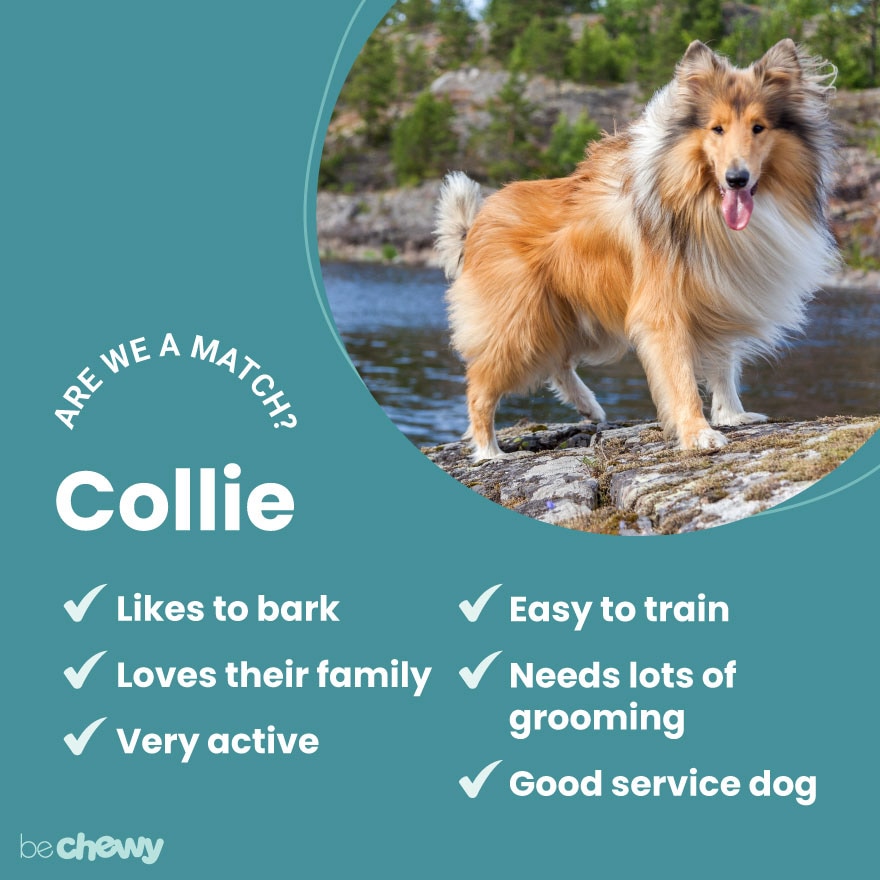
Top Takeaways
What would life be like with your very own “Lassie”? Besides Hollywood fame, Collies have a lot to offer: They’re fun, friendly, family-focused dogs, all wrapped up in a beautiful, athletic and intelligent package. If you don’t mind some barking and some dog hair in the hallway (and on the couch, in your bathroom… well, everywhere, really), you may have found yourself the ideal family companion.
Expert input provided by veterinarian Dr. Lou Avant, DVM, of Lassiter Animal Hospital in Marietta, Georgia; and certified dog trainer Steven Tallas, CDTK, of Venture Dog Training. in Houston and Austin, Texas.
Breed characteristic ratings provided by veterinarian Dr. Sarah J. Wooten, DVM, CVJ, a veterinarian at Sheep Draw Veterinary Hospital in Greeley, Colorado; dog trainer and behavior consultant Irith Bloom, CPDT-KSA, CBCC-KA, CDBC, owner of The Sophisticated Dog, LLC, in Los Angeles; and certified animal behavior consultant Amy Shojai, CABC, in Sherman, Texas.
The health content was medically reviewed by Chewy vets.

Search for Adoptable Collies Near You
Female Names
- Luna
- Bella
- Daisy
- Sadie
- Lucy
- Piper
- Willow
- Maggie
- Bailey
- Molly
Male Names
- Milo
- Cooper
- Finn
- Max
- Charlie
- Ollie
- Scout
- Bandit
- Tucker
- Loki
Share:
